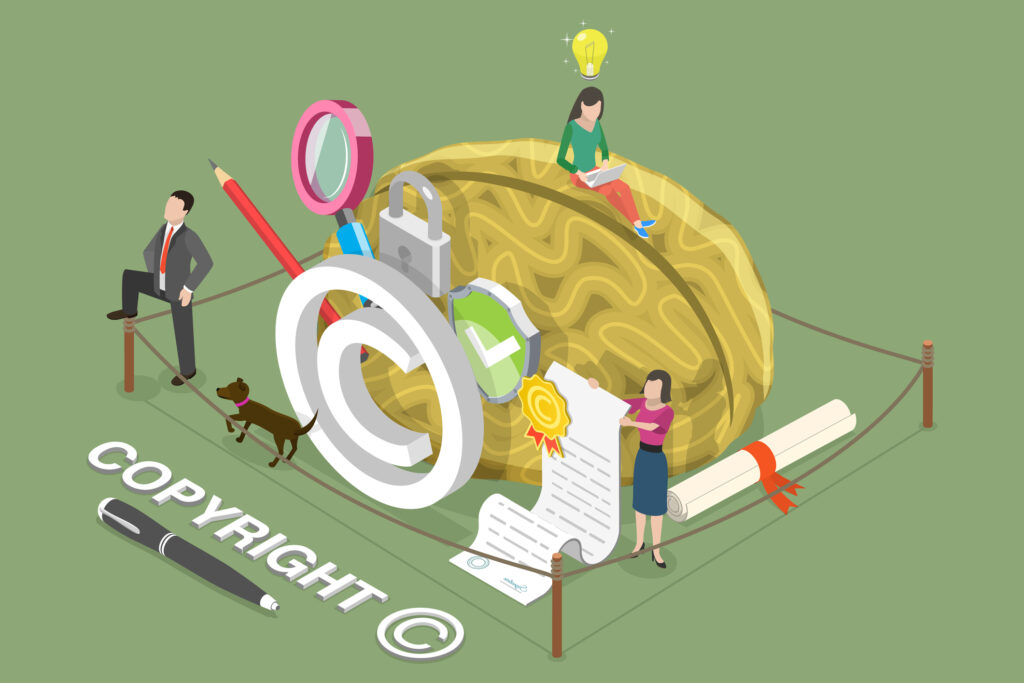If you are writing content for your business website or blog, and you don’t have a background as a copywriter, you might not have thought too much about copyright. But, if you publish content on the web, it does apply to you. Read on for a guide to the basics of Australian copyright, how it works, and how AI is changing the landscape.
At a glance…
- Australian copyright law protects all ‘original’ written work.
- No one can claim copyright over an idea.
- Copyright protection is free and you don’t have to register for it.
- Keep dated copies of material to help prove you own copyright over a piece of text.
- AI and the (potentially) changing copyright landscape.
What is copyright?
As defined by the Australian Attorney-General’s Department website, copyright “provides legal protection for people who express original ideas and information in certain forms.”
It’s one type of IP (intellectual property) and protects the original expression of an idea, not the idea itself. For example, if you write an article on the latest innovations in renewable energy, or one that provides 10 tips for choosing business copywriters, it doesn’t mean that other writers can’t write on precisely the sane topic. But if a writer substantially copies your article, word for word, they’re likely to be breaching your copyright.
Copyright is a term that’s often confused with copywriting, which is the act of writing copy.

What does copyright protect?
It typically applies to writing, visual images, music and video or film. In the context of writing, copyright protects all original textual material, from articles, to business reports, poems and novels.
What isn’t protected by copyright?
There is no copyright on ideas, concepts, thoughts, information or techniques. One reason for this exclusion is that ideas and information can evolve, and in many cases they grow out of many people’s contributions.
It’s also helpful to know that names, titles and slogans are not usually subject to copyright protection. This is because they are held to be ‘too small or unoriginal’ to feasibly be protected in law. However, using a name already being used by someone else can create other legal problems, so always check beforehand.
What does this mean for me?
In practical terms, you are likely to be infringing copyright if you copy text from somewhere else – a blog or competitor website for example – and use it as though you had written it yourself from scratch. Although you can’t just cut and paste from someone else’s article, you can quote from a source as long as you acknowledge the source. You can also use an idea from another article as a springboard for a blog post or article of your own on that topic. If you do this, consider citing the original source, or linking to it, in your own article.
You might not want to cite a competitor’s website of course, but referencing an authoritative commentator in your field shows you are keeping abreast of developments, and tells your target audience that you are likely to be a good source of relevant information.
What if I hire copywriters to write my content?
If you’re publishing content that paid copywriters have written for your business, you can use a tool such as Copyscape to check for plagiarism, and reduce the risk that you’ll inadvertently breach someone else’s copyright.
How can I protect my own work?
In Australia, the moment your fingers hit the keyboard, the text is protected by copyright. Protection is automatic at point of creation, and it lasts for your lifetime plus 70 years, or 70 years after first publication.
Copyright protection carries no cost or administrative burden. That’s right, copyright is free. You don’t need to register your material or fill in any forms. You don’t even need to put a copyright notice on it (that’s the © symbol by the way). Becoming a verified Google+ author may also help to prevent people from claiming credit for your online content.
Using the “©” symbol
While you don’t need to have a copyright notice on your work for it to be protected, having one does make the point that the material should not be regarded as open source, or copyright free.
A copyright notice is simply created as follows: © (your name) (year of creation) e.g. © Amy Generic 2013. Again, there’s no formality about this, just hit the keyboard and put it at the end of your work.
It’s my copyright. How can I prove it?
Not everyone retains copyright. For example, professional web copywriters often give copyright over an article or web page content to a client. Where you do own copyright, proving it is largely a matter of good record keeping. Just as you’d keep good financial records, retaining receipts and invoices, you should retain original, dated copies of your material. You can back this up with copies of relevant business communications.
Evidence can include:
- Dated outlines and drafts
- Dated records of research
- Discussions you had with others about the work
- Your ability to prove that you showed drafts or the finished version to others
- Written records of agreements about ownership of copyright
So there you have it. Your own work is automatically protected, and you can take steps to reduce the risk of infringing someone else’s rights by investing in a plagiarism checker, and being careful to cite sources where needed. However, there are some new issues to consider around copyright and website content.
What to do if someone copies your writing work
If someone blatently copies and publishes your work, you can contact an IP lawyer and arrange to issue a ‘take down notice’ if that is the appropriate action for your situation.
AI and Copyright
The emergence of AI writing tools and generative AI platforms like ChatGPT in 2023 has raised new challenges around copyright, and created some very murky grey areas! Laws haven’t quite caught up with the changing landscape in content creation, and there are currently a number of cases before the courts that relate to copyright.

There are two key issues of interest to content creators:
- Material that is subject to copyright has been used to train AI. Existing law doesn’t include an exception for the use of copyright material in this way. This could mean that if courts decide copyright has been breached, work produced and published as a result might also be considered in breach.
- When you create work using AI, you might or might not own the copyright. That’s because under existing law human endeavour needs to be involved for copyright to exist – but pre-AI it wasn’t necessary to determine the amount of human endeavour that qualifies!
The Arts Law Centre of Australia has published a fact sheet on AI and Copyright Issues that goes into more detail on these issues.
It’s likely we’ll see some legislative changes and court decisions that deal with these complexities, but tht could take some time. We can also expect AI interests to push for changes to the law that would allow AI platforms to mine websites for information without breaching copyright.
Meanwhile, if you’re a content creator, I recommend being aware of the risks in using AI to create content, and staying up to date with any changes to copyright laws in Australia.




